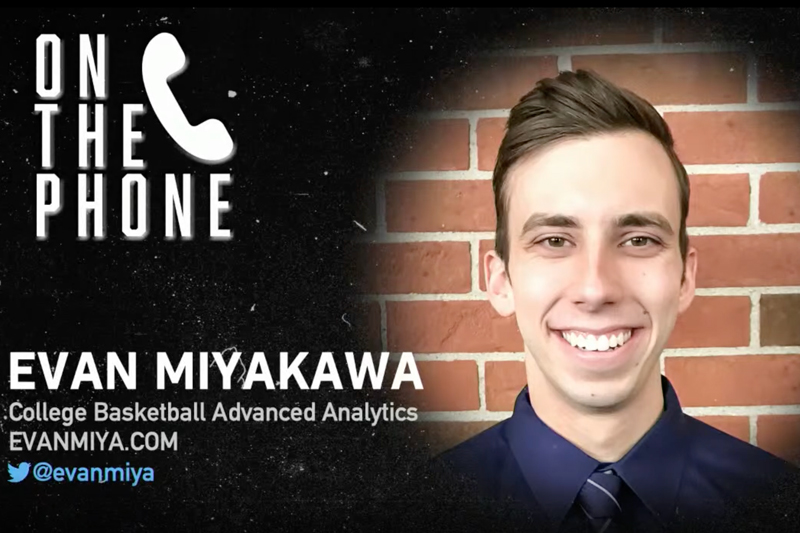- About
- Admissions
-
Academics
- Undergraduate Programs
- Pre-Major
-
Departments
- Overview
- Art Program
- Biblical Studies, Christian Ministries, Intercultural Studies & Philosophy Department
- Biology Program
- Business Department
- Chemistry Department
- Communication Department
- Computer Science & Engineering Department
- Education Department
- Engineering Program
- English Program
- Environmental Science & Sustainable Development Program
- Film & Media Program
- History, Global & Political Studies Department
- Kinesiology Department
- Mathematics Department
- Modern Languages Program
- Music Program
- Physics Program
- Psychology Department
- Social Work Program
- Sociology Program
- Theatre & Dance Program
- Liberal Arts
- Study Abroad
- Graduate Programs
- Online Programs & Licensures
- Special Programs
- Academic Enrichment Center
- Life at Taylor
Info For
Math Alumnus’ Work Featured on ESPN

At Taylor, students are encouraged to pursue what they are passionate about while integrating the skills that they learn in the classroom. For Mathematics alumnus Dr. Evan Miyakawa ’17, Taylor provided an opportunity for him to combine his love of math with his passion for college basketball.
Getting Started with Data Analytics
Miyakawa grew up surrounded by statistics and college basketball. His parents are statisticians, and his childhood was filled with sports scores and analytics. At Taylor, he was a Mathematics major and was interested in pursuing statistics. He played intramural basketball, but it was not until after he graduated that he started combining college basketball and statistics.
Miyakawa graduated from Taylor in 2017 and began looking for graduate programs. He was intrigued by Baylor University’s masters program, and the financial aid worked out in such a way that he enrolled in the PhD program and completed both his masters and PhD consecutively through the same program. He graduated with his PhD in 2022.
“I was definitely well prepared for graduate school because of my undergraduate classes at Taylor,” Miyakawa said. “I was also pushed to communicate ideas well at Taylor. Beyond just understanding facts and details, it was important to be able to articulate them to other people, both people who understood it and people who were new to it.”
From Side Hobby to Career
In 2020, Miyakawa created the website evanmiya.com as a hobby and a way to synthesize his college basketball analytics in one place. Using a free website builder, he used algorithms and statistics to analyze both players and teams as a whole. The process was filled with trial and error, but his website became very popular in the college basketball world. His work has since been featured on CBS Sports, ESPN, and Sports Illustrated, among other major sports networks.
“It seems like every single year things happen in our lives that we don’t expect, and God is always using them to guide us in a better direction,” Miyakawa said. “When I started fiddling around with making sports rankings years ago, I could not have anticipated that God would use that to lead me to being a data scientist working with NBA teams along with having my own college basketball analytics website.”
Zelus Analytics
Currently, Miyakawa is working with Zelus Analytics, a company that contracts with professional sports teams for analytics. Miyakawa builds statistical models that capture individual player behavior and how that contributes to the team’s success as a whole. Zelus is contracted by a variety of different professional sports teams to provide analytics which help the teams make decisions about players and strategies based on that data.
“The career path to being a data scientist in sports specifically was something that I always thought was really cool, but not necessarily something that was something super achievable,” Miyakawa said. “It seemed like there were only a small number of people doing it and it felt competitive, so the fact that I’m now working as a data scientist for what I consider to be the best company in the world doing analytics work in the sports industry is a dream job for me.”
Zelus Analytics is a remote company, allowing Miyakawa to work with colleagues from all over the world.
Build Skills for the Future
Invited back to Taylor by mathematics professors Dr. Derek Thompson and Dr. Daniel Rodman, Miyakawa recently gave a presentation at Taylor entitled “Breaking Into the Field of Sports Analytics: A Conversation on Sports, Data Science, and Being a Young Professional” to give current Mathematics and Computer Science students an idea of what is possible for them after graduation. He emphasized the opportunities that higher education can provide and shared how his passion project was featured on ESPN.
“There’s nothing stopping you from trying to do cool stuff now,” Miyakawa encouraged current students. “Practice applying your math and computer science skills to real world problems. Even if the output isn’t anything super useful, it helps you build skills that you will use in the future.”
Interested in learning about Taylor’s Mathematics program? Click here to find out more.

